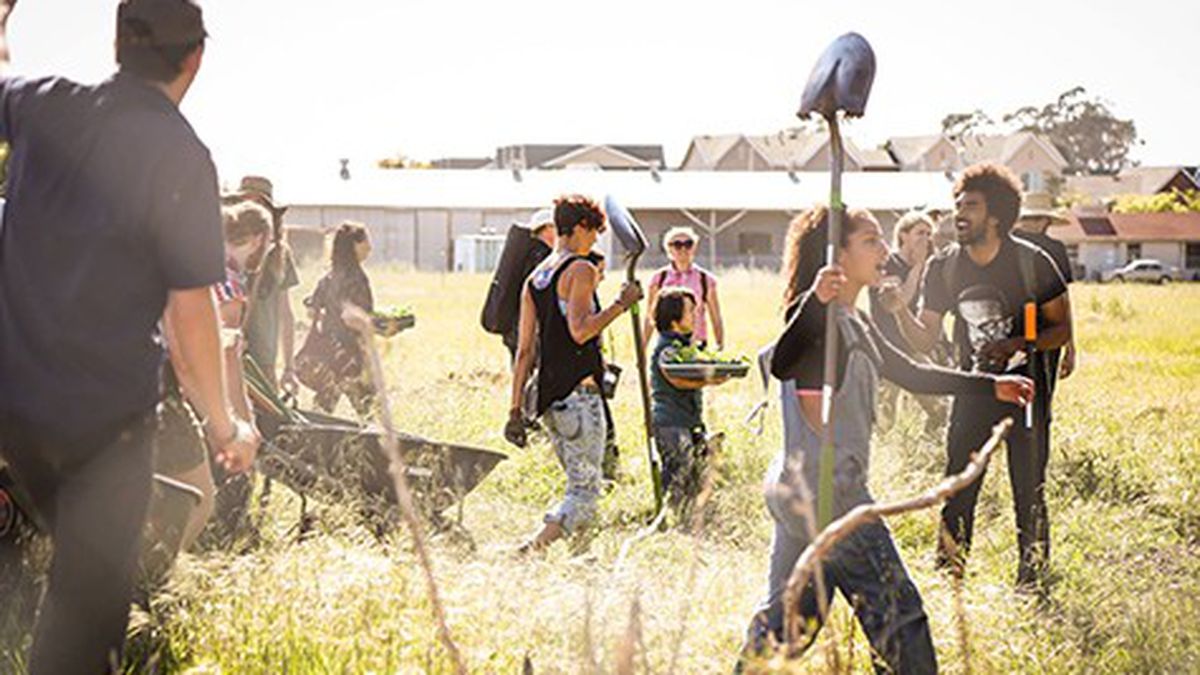According to Cultivating the Commons, a 2009 analysis by UC Berkeley Geography Department students Nathan McClintock and Jenny Cooper, the City of Oakland has more than 800 acres of unused, arable public land — much of it consisting of vacant lots in East and West Oakland — that, if cultivated, could easily supply as much as 5 percent of city residents’ total fruit and vegetable needs.
That statistic is one impetus for Oakland Spring Rising, a new initiative by a group of Bay Area food justice advocates — to launch forty new urban farms and community gardens in Oakland in the next forty days. David Grefrath, the main organizer, explained that the idea is to put the city’s many vacant lots to new use, with a lofty goal of growing enough to provide 100 pounds of fresh produce to each of Oakland’s roughly 400,000 residents.
If the project’s name has a bit of a revolutionary bent, that’s probably no coincidence. Grefrath, a self-taught gardener who cut his urban-farming teeth in New Orleans’ Lower Ninth Ward as a volunteer during post-Hurricane Katrina relief efforts, was later one of the leaders of Occupy the Farm, an ongoing movement in which activists seized a plot of UC Berkeley-owned land in Albany called the Gill Tract and turned it into an urban farm.
According to Grefrath, the goals of Oakland Spring Rising are manifold, with the issue of food security being first and foremost. There’s the benefit of removing urban blight, too. Grefrath cited Afrika Town, a dilapidated West Oakland lot turned into an attractive urban garden, as one recent example.
But Grefrath said that what will really set Oakland Spring Rising apart from other movements is its emphasis on soil remediation — on testing soil for toxicity, and then using plants and mushrooms to treat toxic soil. The goal would be to eventually return to growing food directly in the soil rather than only in raised beds — a more transformative project than “how do we grow a bunch of food,” Grefrath said.
Since the initiative’s local reference points include Afrika Town and Occupy the Farm, for some observers, the proverbial elephant in the room will be whether Oakland Spring Rising will be rooted in confrontation and quasi-legal appropriation of privately owned land. Grefrath didn’t dismiss the possibility that Oakland Spring Rising might borrow some of those techniques — that volunteers might “occupy,” or essentially squat on, a blighted lot they hadn’t received explicit permission to use.
Still, according to Grefrath, these kinds of confrontational techniques are a matter of last resort. He said he’d prefer to work with property owners who are enthusiastic about collaborating.
Oakland Spring Rising officially kicked off on May 1. There’s a crowdfunding component to the project, as well — a $5,000 campaign at Crowdrise.com/OaklandSpringRising. But, as Grefrath noted, one of the nice things about the project is that it doesn’t require a lot of capital: For just $200, you can buy everything you need to grow about 10,000 plants.
Not Your Everyday Taco
For the past six years, Jose Ramos has worked at some of the Bay Area’s most prominent farm-to-table Mexican restaurants — first, at San Francisco’s Nopalito, where Ramos was one of the opening chefs, and more recently at Oakland’s Nido (444 Oak St.), where he currently helps oversee the kitchen. Now, Ramos and his wife Elizabeth Tinajero — a culinary school grad and accomplished home cook — hope to bring their healthy, locally sourced approach to Mexican cooking to a farmers’ market near you.
The business will be called León, after a city in Ramos’s home state of Guanajuato, Mexico, and while it will be based at a commercial kitchen in Emeryville, the project’s focal point will be a mobile taco cart that will allow Ramos and Tinajero to serve their food all over the Bay Area. The couple has launched a $9,000 crowdfunding campaign to help get León off the ground.
According to Ramos, there will be several components to the business. In addition to selling a variety of tacos served on made-to-order corn tortillas, the farmers’ market stand will also carry a line of house-made salsas and moles that can be purchased by the bottle. Ramos said he also plans to do a variety of pop-up events.
Meanwhile, the farmers’ market taco cart should offer regional specialties not commonly found at Mexican restaurants in the Bay Area. Examples he cited include Mexican-style blood sausages, mixiote (a barbacoa-like barbecued meat known for its deeply concentrated flavors), and tacos de canasta (“from a basket”) — small steamed tacos filled with different kinds of stew.
There will also be a selection of seasonal salads; indeed, while some of the spices and dried chilies will be imported from Mexico, Ramos said he’ll use local and seasonal ingredients whenever possible.
If the campaign raises $15,000, Ramos will buy a stone grinder and use it for grinding heirloom corn to make his own nixtamal — corn cooked and treated with slaked lime in preparation for making fresh masa, as opposed to the dried powder form used by many commercial tortillerias. If that’s the case, León’s tortillas alone may be worth a trip.
León is tentatively scheduled to launch in November.















